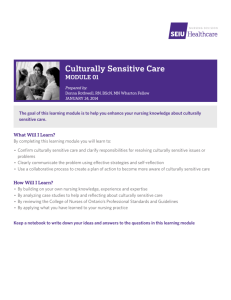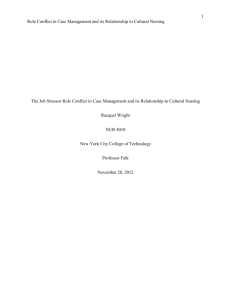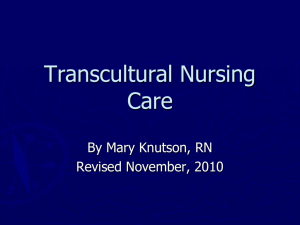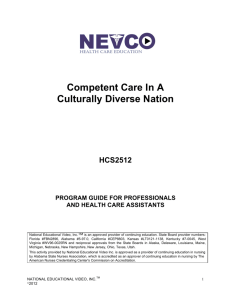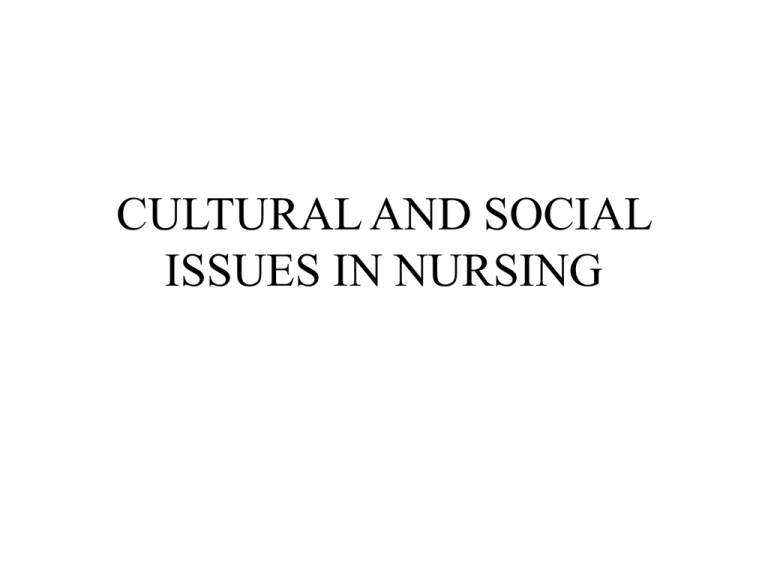
CULTURAL AND SOCIAL
ISSUES IN NURSING
Key concept
Demographic and sociocultural variations
of diverse groups
Variations in biological, social,
environmental, and communications
phenomena
Education, practice, and research issues that
influence culturally competent care
Inherent in nursing is respect for life, dignity and
rights of man. It is unrestricted by considerations of
nationality, race, creed, colour, age, sex, politics or
social status.
The nurse, in providing care, promotes an
environment in which the values, customs and
spiritual beliefs of the individual are respected.
Contd…
Each registered nurse is accountable for his or
her practice, and, in the exercise of professional
accountability shall take account of the customs,
values and spiritual beliefs of patients/ clients.
Individualized programs of nursing care are
designed to accommodate the psychological,
social, cultural and spiritual needs of clients, as
well as their biological needs.
Contd…
Providing culturally appropriate nursing care can be
very challenging, requiring much thought and caring
concern, and a willingness to learn from those we
nurse.
Not only nurses must be a ware of the clients cultural
point of view his relation to the life , to realize his
vision of his world, but be willing to look at health
needs and problems in new ways, planning nursing
interventions that are culturally acceptable and
meaningful to the client
Health Disparities
Life expectancy for whites is 75.2 years; for
African-Americans, 69.6 years
Causes of death for minority groups
Cancer
Cardiovascular disease and stroke
Chemical dependency
Diabetes
Homicides and accidents
Infant mortality
Reasons for Cultural Competence
Nurse’s culture often differs from client’s.
Culturally incompetent care is more costly.
Culturally incompetent care is ineffective.
Cultural Competence
in Nursing Education
Beliefs and practices of various cultural groups
Disease prevalence and mortality rates
Cultural factors related to situations such as birth
and death
Specific culture-bound syndromes
Roles and responsibilities of family members
Principles for
Culturally Competent Care
Care designed for specific client
Care based on uniqueness of person’s culture
Care includes empowerment strategies.
Care is provided with sensitivity for the
uniqueness of the client.
Standards for culturally competent
and congruent care
Consumers of diverse cultures have a right to
have Tran cultural care standards used to protect
and respect their generic (folk) values, beliefs, and
practices and to have health personnel incorporate.
nurses providing care to diverse culture or
subcultures have a moral obligation to be prepared
in Trans cultural nursing to provide knowledgeable,
sensitive, and research-based care to the culturally
different.
Nurses as caregivers have an ethical, morale,
professional obligation and responsibility to study,
understand, and use relevant research-based Trans
cultural care for safe, beneficial, and satisfying
client or family outcomes.
Providing culturally competent and congruent
care should reflect the caregivers ability to assess
and use culture-specific data without biases,
prejudices, discrimination, or related negative
outcome
Professional Journals
Devoted to Cultural Issues
The Journal of Transcultural Nursing
Western Journal of Medicine
Cross-Cultural Issues
Journal of Cultural Diversity
Journal of Multicultural Nursing
THANKYOU


